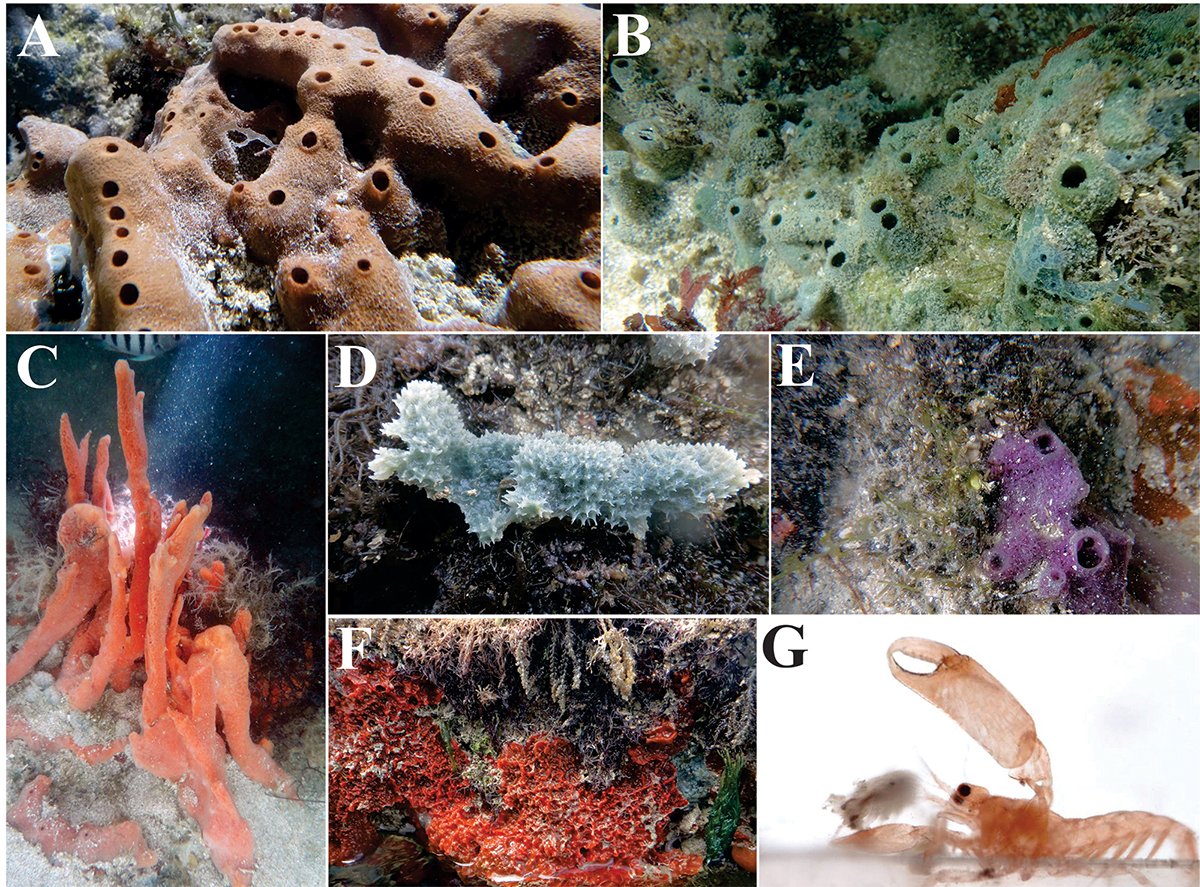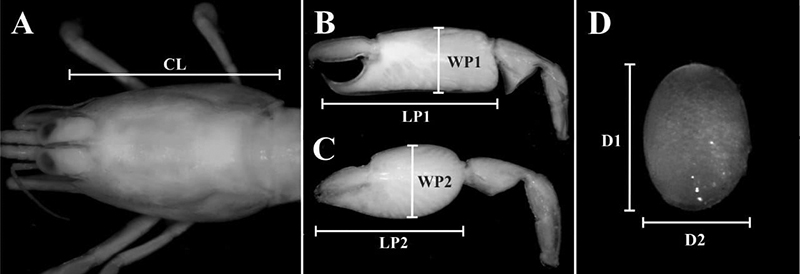|
Ty. anaramosaeNeves, 2020Neves, K. 2020. A new species of the shrimp genus Typton Costa, 1844 (Malacostraca, Decapoda, Palaemonidae) from the Cabo Verde Archipelago. Zootaxa, 4768: 264-270.
|
Eastern Atlantic |
probably Spongionella sp. (sponge) |
Neves (2020Neves, K. 2020. A new species of the shrimp genus Typton Costa, 1844 (Malacostraca, Decapoda, Palaemonidae) from the Cabo Verde Archipelago. Zootaxa, 4768: 264-270.) |
|
Ty. ascensionisManning and Chace, 1990Manning, R.B. and Chace, Jr. F.A. 1990. Decapod and stomatopod Crustacea from Ascension Island, South Atlantic Ocean. Smithsonian Contributions to Zoology, 503: 1-91.
|
Central Atlantic |
algae |
Manning and Chace (1990Manning, R.B. and Chace, Jr. F.A. 1990. Decapod and stomatopod Crustacea from Ascension Island, South Atlantic Ocean. Smithsonian Contributions to Zoology, 503: 1-91.) |
|
Ty. australisBruce, 1973Bruce, A.J. 1973. Typton australis sp. nov., a new pontoniid shrimp from the Great Barrier Reef, Australia. Records of the Australian Museum, 28: 253-263.
|
Indo-Pacific |
Psammoclema sp. (sponge) |
Bruce (1984Bruce, A.J. 1984. The pontoniine shrimp fauna of Australia. Australian Museum Memoir, 18: 195-218. ), as Psammopemma sp. |
|
Ty. bawiiBruce, 1972Bruce, A.J. 1972. Notes on some Indo-Pacific Pontoniinae, XXI. Typton bawii sp. nov., the first occurrence of the genus Typton Costa in the Indian Ocean (Decapoda Natantia, Palaemonidae). Crustaceana, 23: 243-254.
|
Indo-Pacific |
Unidentified sponge |
Bruce (1972Bruce, A.J. 1972. Notes on some Indo-Pacific Pontoniinae, XXI. Typton bawii sp. nov., the first occurrence of the genus Typton Costa in the Indian Ocean (Decapoda Natantia, Palaemonidae). Crustaceana, 23: 243-254. ) |
|
Ty. capricorniaeBruce, 2000Bruce, A.J. 2000. Typton manningi and T. capricorniae, new species, new pontoniine shrimps from northern Queensland, with a review of the Indo-West Pacific species of Typton Costa (Decapoda: Palaemonidae). Journal of Crustacean Biology, 20: 87-100.
|
Indo-Pacific |
Unidentified sponge |
Bruce (2000Bruce, A.J. 2000. Typton manningi and T. capricorniae, new species, new pontoniine shrimps from northern Queensland, with a review of the Indo-West Pacific species of Typton Costa (Decapoda: Palaemonidae). Journal of Crustacean Biology, 20: 87-100.) |
|
Ty. carneusHolthuis, 1951Holthuis, L.B. 1951. A general revision of the Palaemonidae (Crustacea Decapoda Natantia) of the Americas. I. The subfamilies Euryrhynchidae and Pontoniinae. Allan Hancock Foundation Publications of the University of Southern California, Occasional Paper, 11: 1-332.
|
Western Atlantic |
Dysidea etheriaLaubenfels, 1936Laubenfels, M.W. 1936. A discussion of the sponge fauna of the Dry Tortugas in particular and the West Indies in general, with material for a revision of the families and orders of the Porifera. Papers from the Tortugas Laboratory of the Carnegie Institution of Washington, 467: 1-225. (sponge) |
Present study |
|
Haliclona implexiformisHechtel, 1965Hechtel, G.J. 1965. A systematic study of the Demospongiae of Port Royal, Jamaica. Bulletin of the Peabody Museum of Natural History, 20: 1-103. (sponge) |
Present study |
|
Tedania ignisDuchassaing and Michelotti, 1864Duchassaing De Fonbressin, P. and Michelotti, G. 1864. Spongiaires de la Mer Caraibe. Natuurkundige verhandelingen van de Hollandsche maatschappij der wetenschappen te Haarlem, 21: 1-124.) (sponge) |
Duris et al. (2011Ďuriš, Z.; Horká, I.; Juračka, P.J.; Petrusek, A. and Sandford, F. 2011. These squatters are not innocent: The evidence of parasitism in sponge-inhabiting shrimps. PLoS ONE, 6: e21987. ); Pachelle et al. (2016Pachelle, P.P.G.; Anker, A.; Mendes, C.B. and Bezerra, L.E.A. 2016. Decapod crustaceans from the state of Ceará, northeastern Brazil: an updated checklist of marine and estuarine species, with 23 new records. Zootaxa, 4131: 1-63.) |
|
Tedania cf. ignis (sponge) |
De Grave and Anker (2017De Grave, S. and Anker, A. 2017. An annotated checklist of marine caridean and stenopodidean shrimps (Malacostraca: Decapoda) of the Caribbean coast of Panama. Nauplius, 25: e2017015.) |
|
T. cf. klausiWulff, 2006Wulff, J.L. 2006. Sponge systematics by starfish: predators distinguish cryptic sympatric species of Caribbean fire sponges, Tedania ignis and Tedania klausi n.sp. (Demospongiae, Poecilosclerida). Biological Bulletin, 211: 83-94. (sponge) |
De Grave and Anker (2017De Grave, S. and Anker, A. 2017. An annotated checklist of marine caridean and stenopodidean shrimps (Malacostraca: Decapoda) of the Caribbean coast of Panama. Nauplius, 25: e2017015.) |
|
T. klausi (sponge) |
Duris et al. (2011Ďuriš, Z.; Horká, I.; Juračka, P.J.; Petrusek, A. and Sandford, F. 2011. These squatters are not innocent: The evidence of parasitism in sponge-inhabiting shrimps. PLoS ONE, 6: e21987. ) |
| Unidentified sponge |
Ramos-Porto and Coelho (1998Ramos-Porto, M. and Coelho, P.A. 1998. Malacostraca. Eucarida. Caridea (Alpheoidea excluded). p. 325-350. In: P.S. Young (ed), Catalogue of Crustacea of Brazil. Museu Nacional, Rio de Janeiro. (Série Livros 6).); Chace (1972Chace Jr, F.A. 1972. The shrimps of the Smithsonian-Bredin Caribbean Expeditions with a summary of the West Indian shallow-water species (Crustacea: Decapoda: Natantia). Smithsonian Contributions to Zoology, 98: 1-179.) |
|
Ty. crosslandiBruce, 1978Bruce, A.J. 1978. Typton crosslandi sp. nov., a new pontoniine shrimp, from the Galapagos Islands. Crustaceana, 35: 294-300.
|
Eastern Pacific |
no host/habitat reported |
Bruce (1978Bruce, A.J. 1978. Typton crosslandi sp. nov., a new pontoniine shrimp, from the Galapagos Islands. Crustaceana, 35: 294-300.) |
|
Ty. distinctusChace, 1972Chace Jr, F.A. 1972. The shrimps of the Smithsonian-Bredin Caribbean Expeditions with a summary of the West Indian shallow-water species (Crustacea: Decapoda: Natantia). Smithsonian Contributions to Zoology, 98: 1-179.
|
Western Atlantic |
Tedania ignis (sponge) |
Duris et al. (2011Ďuriš, Z.; Horká, I.; Juračka, P.J.; Petrusek, A. and Sandford, F. 2011. These squatters are not innocent: The evidence of parasitism in sponge-inhabiting shrimps. PLoS ONE, 6: e21987. ) |
|
T. klausi (sponge) |
Duris et al. (2011Ďuriš, Z.; Horká, I.; Juračka, P.J.; Petrusek, A. and Sandford, F. 2011. These squatters are not innocent: The evidence of parasitism in sponge-inhabiting shrimps. PLoS ONE, 6: e21987. ) |
|
Dragmacidon reticulatus (Ridley and Dendy, 1886Ridley, S.O. and Dendy, A. 1886. Preliminary report on the Monaxonida collected by H.M.S. Challenger. Annals and Magazine of Natural History, 18: 325-351.) (sponge) |
Moraes et al. (2020Moraes, I.R.; Bergamasco, G.R.; Santos, R.C.; Antunes, M.; Soledade, G.O.; Costa, R.C. and Castilho, A.L. 2020. New record of the sponge-dwelling shrimp Typton distinctus Chace, 1972 (Decapoda: Caridea: Palaemonidae) in São Paulo State, Brazil. Zootaxa, 4763: 444- 446.) |
| Unidentified sponge |
Ramos-Porto and Coelho (1998Ramos-Porto, M. and Coelho, P.A. 1998. Malacostraca. Eucarida. Caridea (Alpheoidea excluded). p. 325-350. In: P.S. Young (ed), Catalogue of Crustacea of Brazil. Museu Nacional, Rio de Janeiro. (Série Livros 6).); Chace (1972Chace Jr, F.A. 1972. The shrimps of the Smithsonian-Bredin Caribbean Expeditions with a summary of the West Indian shallow-water species (Crustacea: Decapoda: Natantia). Smithsonian Contributions to Zoology, 98: 1-179.) |
|
Ty. fapespaeAlmeida, Anker and Mantellato, 2014Almeida, A.O.; Anker, A. and Mantelatto, F.L. 2014. A new snapping species of the shrimp genus Typton Costa, 1844 (Decapoda: Palaemonidae) from the coast of São Paulo, southeastern Brazil. Zootaxa, 3835: 110-120.
|
Western Atlantic |
Mycale (Zygomycale) angulosaDuchassaing and Michelotti, 1864Duchassaing De Fonbressin, P. and Michelotti, G. 1864. Spongiaires de la Mer Caraibe. Natuurkundige verhandelingen van de Hollandsche maatschappij der wetenschappen te Haarlem, 21: 1-124. (sponge) |
Almeida et al. (2014Almeida, A.O.; Anker, A. and Mantelatto, F.L. 2014. A new snapping species of the shrimp genus Typton Costa, 1844 (Decapoda: Palaemonidae) from the coast of São Paulo, southeastern Brazil. Zootaxa, 3835: 110-120.); Duarte and Nalesso (1996Duarte, L.F.L. and Nalesso, R.C. 1996. The sponge Zygomycale parishii (Bowerbank) and its endobiotic fauna. Estuarine, Coastal and Shelf Science, 42: 139-151.) reported T. gnathophylloides, actually T. fapespae (see Almeida et al., 2014Almeida, A.O.; Anker, A. and Mantelatto, F.L. 2014. A new snapping species of the shrimp genus Typton Costa, 1844 (Decapoda: Palaemonidae) from the coast of São Paulo, southeastern Brazil. Zootaxa, 3835: 110-120.) in a sponge erroneously identified as Zygomycale parishii (Bowerbank, 1875Bowerbank, J.S. 1875. Contributions to a general history of the Spongidae. Part VII. Proceedings of the Zoological Society of London, 1875: 281-296.) (see Van Soest, 1984Van Soest, R.W.M. 1984. Marine sponges from Curaçao and other Caribbean localities. Part III. Poecilosclerida. Studies on the Fauna of Curaçao and other Caribbean Islands, 66: 1-173.) |
|
Ty. gnathophylloidesHolthuis, 1951Holthuis, L.B. 1951. A general revision of the Palaemonidae (Crustacea Decapoda Natantia) of the Americas. I. The subfamilies Euryrhynchidae and Pontoniinae. Allan Hancock Foundation Publications of the University of Southern California, Occasional Paper, 11: 1-332.
|
Western Atlantic |
Amphimedon viridisDuchassaing and Michelotti, 1864Duchassaing De Fonbressin, P. and Michelotti, G. 1864. Spongiaires de la Mer Caraibe. Natuurkundige verhandelingen van de Hollandsche maatschappij der wetenschappen te Haarlem, 21: 1-124. (sponge) |
Soledade et al. (2017Soledade, G.O.; Santos, G.G.; Pinheiro, U. and Almeida, A.O. 2017. New records of association between caridean shrimps (Decapoda) and sponges (Porifera) in Abrolhos Archipelago, northeastern Brazil. Nauplius, 25: e2017027.) |
|
Ty. granulosusAyón-Parente, Hendrickx and Galvan-Villa, 2015Ayón-Parente, M.; Hendrickx, E.M. and Galvan-Villa, C.M. 2015. A new species of the genus Typton Costa (Crustacea: Decapoda: Palaemonidae: Pontoniinae) from the eastern tropical Pacific. Zootaxa, 3926: 430-438.
|
Western Atlantic |
Holothuria (Halodeima) inornataSemper, 1868Semper, C. 1868. Reisen im Archipel der Philippinen. Zweiter Theil. Wissenschaftliche Resultate. Erster Band. Holothurien. Hefte iv. and v: Unpaginated. (sea-cucumber) |
Ayón-Parente et al. (2015Ayón-Parente, M.; Hendrickx, E.M. and Galvan-Villa, C.M. 2015. A new species of the genus Typton Costa (Crustacea: Decapoda: Palaemonidae: Pontoniinae) from the eastern tropical Pacific. Zootaxa, 3926: 430-438.) |
|
Ty. hephaestusHolthuis, 1951Holthuis, L.B. 1951. A general revision of the Palaemonidae (Crustacea Decapoda Natantia) of the Americas. I. The subfamilies Euryrhynchidae and Pontoniinae. Allan Hancock Foundation Publications of the University of Southern California, Occasional Paper, 11: 1-332.
|
Eastern Pacific |
no host/habitat reported |
Holthuis (1951Holthuis, L.B. 1951. A general revision of the Palaemonidae (Crustacea Decapoda Natantia) of the Americas. I. The subfamilies Euryrhynchidae and Pontoniinae. Allan Hancock Foundation Publications of the University of Southern California, Occasional Paper, 11: 1-332. ) |
|
Ty. holthuisiDe Grave, 2010De Grave, S. 2010. A new species of the genus Typton Costa (Decapoda, Palaemonidae, Pontoniinae) from Ascension Island. Crustaceana Monographs, 14: 209-218.
|
Central Atlantic |
algae |
De Grave (2010De Grave, S. 2010. A new species of the genus Typton Costa (Decapoda, Palaemonidae, Pontoniinae) from Ascension Island. Crustaceana Monographs, 14: 209-218.) |
|
Ty. manningiBruce, 2000Bruce, A.J. 2000. Typton manningi and T. capricorniae, new species, new pontoniine shrimps from northern Queensland, with a review of the Indo-West Pacific species of Typton Costa (Decapoda: Palaemonidae). Journal of Crustacean Biology, 20: 87-100.
|
Indo-Pacific |
Ircinia sp. (sponge) |
Bruce (2000Bruce, A.J. 2000. Typton manningi and T. capricorniae, new species, new pontoniine shrimps from northern Queensland, with a review of the Indo-West Pacific species of Typton Costa (Decapoda: Palaemonidae). Journal of Crustacean Biology, 20: 87-100.) |
|
Ty. prionurusHolthuis, 1951Holthuis, L.B. 1951. A general revision of the Palaemonidae (Crustacea Decapoda Natantia) of the Americas. I. The subfamilies Euryrhynchidae and Pontoniinae. Allan Hancock Foundation Publications of the University of Southern California, Occasional Paper, 11: 1-332.
|
Western Atlantic |
Callyspongia sp. (sponge); T. ignis (sponge) |
Pachelle et al. (2015Pachelle, P.P.G.; Anker, A. and Tavares, M. 2015. New and additional records of the sponge shrimp genus Typton Costa, 1844 (Decapoda: Palaemonidae) from the Brazilian coast. Papéis Avulsos de Zoologia, 55: 317-322. ); Santana-Moreno et al. (2013Santana-Moreno, L.D.; De Grave, S. and Simões, N. 2013. New records of caridean shrimps (Decapoda: Caridea) from shallow water along the northern Yucatan peninsula coasts of México. Nauplius, 21: 225- 238.) |
|
Ty. serratusHolthuis, 1951Holthuis, L.B. 1951. A general revision of the Palaemonidae (Crustacea Decapoda Natantia) of the Americas. I. The subfamilies Euryrhynchidae and Pontoniinae. Allan Hancock Foundation Publications of the University of Southern California, Occasional Paper, 11: 1-332.
|
Eastern Pacific |
Unidentified sponge |
Fransen et. al. (1997Fransen, C.H.J.M.; Holthuis, L.B. and Adema, J.P.H.M. 1997. Type-catalogue of the Decapod Crustacea in the collections of the Nationaal Natuurhistorisch Museum, with appendices of pre-1900 collectors and material. Zoologische Verhandelingen, 311: 1-344.) |
|
Ty. spongicolaCosta, 1844Costa, O.G. 1844. Su due nuovi generi di Crostacei decapodi macrouri. Annali delle Accademia degli Aspiranti Naturalisti, Napoli, 2: 285-292.
|
Eastern Atlantic; Aegean sea; Mediterranean sea; English Channel |
Cliona viridisSchmidt, 1862Schmidt, O. 1862. Die Spongien des adriatischen Meeres. Leipzig, Wilhelm Engelmann, i-viii, 1-88. (sponge) |
Laubier (1966Laubier, L. 1966. Le coralligene des Alberes: monographie biocenotique. Annales de l’Institut Océanographique de Monaco, 43: 139-316.) |
|
Desmacidon fruticosumMontagu, 1814Montagu, G. 1814. An essay on sponges, with descriptions of all the species that have been discovered on the Coast of Great Britain. Memoirs of the Wernerian Natural History Society, 2: 67-122. (sponge) |
Hunt (1925Hunt, O.D. 1925. The food of the bottom fauna of the Plymouth fishing grounds. Journal of the Marine Biological Association of the United Kingdom, 13: 560-599.), as Desmacidon fructicosa
|
|
Mycale syrinxSchmidt, 1862Schmidt, O. 1862. Die Spongien des adriatischen Meeres. Leipzig, Wilhelm Engelmann, i-viii, 1-88. (sponge) |
Voultsiadou-Koukouras and Koukouras (1989Voultsiadou-Koukoura, E. and Koukouras, A. 1989. Remarks on sponge-decapod associations in the North Aegean Sea. Scientific Annals of the School of Biology, 1: 251-256. ) |
| Unidentified sponge |
Costa (1844Costa, O.G. 1844. Su due nuovi generi di Crostacei decapodi macrouri. Annali delle Accademia degli Aspiranti Naturalisti, Napoli, 2: 285-292. ) |
|
Ty. tortugaeMcClendon, 1911Mcclendon, J.F. 1911. On adaptations in structure and habits of some marine animals of Tortugas, Florida. Papers from the Tortugas Laboratory of the Carnegie Institution of Washington, 3: 57-62.
|
Western Atlantic |
Ircinia strobilinaLamarck, 1816Lamarck, J.B.P. 1816. Histoire naturelle des animaux sans vertèbres. Tome second. Paris, Verdière, 568p. (sponge) |
Santana-Moreno et al. (2013Santana-Moreno, L.D.; De Grave, S. and Simões, N. 2013. New records of caridean shrimps (Decapoda: Caridea) from shallow water along the northern Yucatan peninsula coasts of México. Nauplius, 21: 225- 238.) |
|
Spheciospongia vespariumLamarck, 1815Lamarck, J.B.P. 1815. Suite des polypiers empâtés. Mémoires du Muséum d’Histoire Naturelle, Paris, 1: 69-80. (sponge) |
Bruce (1978Bruce, A.J. 1978. Typton crosslandi sp. nov., a new pontoniine shrimp, from the Galapagos Islands. Crustaceana, 35: 294-300.), as Spheciospongia vesparia
|
| probably I. strobilina (sponge) |
Bruce (1978Bruce, A.J. 1978. Typton crosslandi sp. nov., a new pontoniine shrimp, from the Galapagos Islands. Crustaceana, 35: 294-300.), as Stematumenia strobiliana
|
|
Ty. vulcanusHolthuis, 1951Holthuis, L.B. 1951. A general revision of the Palaemonidae (Crustacea Decapoda Natantia) of the Americas. I. The subfamilies Euryrhynchidae and Pontoniinae. Allan Hancock Foundation Publications of the University of Southern California, Occasional Paper, 11: 1-332.
|
Western Atlantic |
Callyspongia sp. (sponge) |
Pachelle et al. (2015Pachelle, P.P.G.; Anker, A. and Tavares, M. 2015. New and additional records of the sponge shrimp genus Typton Costa, 1844 (Decapoda: Palaemonidae) from the Brazilian coast. Papéis Avulsos de Zoologia, 55: 317-322. ) |
|
Ty. wasiniBruce, 1977Bruce, A.J. 1977. Notes on some Indo-Pacific Pontoniinae, XXVIII. Typton wasini sp. nov., from Wasin Island, Kenya. Crustaceana, 32: 272-285.
|
Indo-Pacific |
Dysidea sp. (sponge) |
Bruce (2010Bruce, A.J. 2010. Pontoniine Shrimps (Crustacea: Decapoda: Palaemonidae) from the CReefs 2009 Heron Island Expedition, with a review of the Heron Island pontoniine fauna. Zootaxa, 2541: 50-68. ) |
|
Haliclona sp. (sponge) |
Bruce (1977Bruce, A.J. 1977. Notes on some Indo-Pacific Pontoniinae, XXVIII. Typton wasini sp. nov., from Wasin Island, Kenya. Crustaceana, 32: 272-285.), as Reniera sp. |

 Thumbnail
Thumbnail
 Thumbnail
Thumbnail
 Thumbnail
Thumbnail
 Thumbnail
Thumbnail



